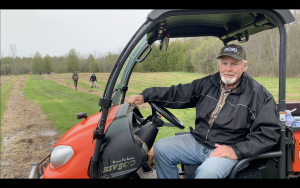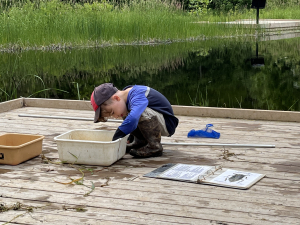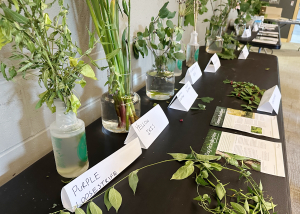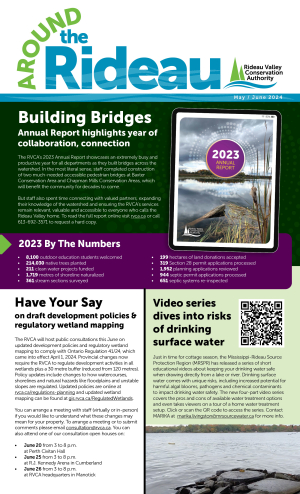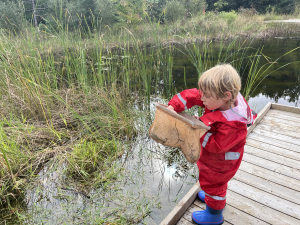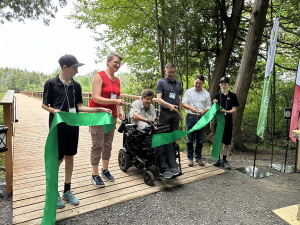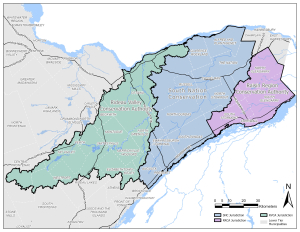Super User
Tree planting protects properties against extreme weather
RIDEAU AND MISSISSIPPI WATERSHEDS, July 31, 2024 – This summer’s weather has been unpredictable at best: torrential rains, extreme heat and even a recent tornado on Christie Lake near Perth.
With this volatility becoming the norm, planting trees on marginal land or unused fields can help protect your property by reducing erosion, creating windbreaks, improving drainage, providing shade and more.
And, comparatively at least, it’s not expensive. The Rideau Valley Conservation Authority (RVCA) offers generous tree planting subsidies for rural landowners in the Rideau and Mississippi watersheds with at least 1.25 acres of suitable land. The full-service program includes customized tree planting plans that suit the landowner’s vision and needs, on-site technical advice, ordering and handling of trees, site preparation, tree planting and tending, and survival assessments for five years.
Landowner costs range from $0.15 per tree within the City of Ottawa to between $0.30 and $0.40 per tree outside the city, depending on quantity.
“It’s an incredibly economical way to protect and improve your property while cutting down on maintenance for idle fields and retired rough pasture,” said Ian Cochrane, RVCA’s forestry manager. “The program keeps your property working without having to do a lot of work yourself.”
Elizabethtown-Kitley farmer Tom Ronan said tree planting has saved him countless hours of bush-hogging since he planted 7,500 trees on several idle fields at the back of his 200-acre property. He’s also saved himself the cost of fuel to run the mowing machine. On top of that, he said it feels good to leave a legacy for future generations.
“By the time these new trees mature, there’s a good chance I won’t be around. But my kids and my grandkids will have an opportunity to enjoy it,” Ronan said. “The trees represent a new growth for the farm. They’ll put some of the scrub land back into use, and it’s helping the environment.”
RVCA’s forestry staff work with landowners across both the Rideau Valley and the Mississippi Valley watersheds. They are now booking site visits for this summer and fall to prepare for tree planting in spring 2025.
To book your site visit, contact Ian Cochrane at or visit https://www.rvca.ca/stewardship-grants/tree-planting to learn more.
Try Forest School this summer during Baxter’s drop-in days!
KARS-ON-THE-RIDEAU, August 1, 2024 – If you’ve always wanted to try Forest School, now’s your chance.Baxter Conservation Area in Kars will offer Summer Forest School Drop-In Days throughout the month of August for both kindergarteners and school-age kids.
Kids aged 4 to 6 (or turning so before Dec. 31, 2024) can register for half-day sessions from 9 to noon on August 23 and 28. The cost for half-day sessions is $30 per child plus HST.
Kids aged 6 to 10 (or turning so before Dec. 31, 2024) can register for full-day sessions from 9 to 3 on August 9, 14, 26 or 27. The cost for full-day sessions is $55 per child plus HST.
These one-day programs will run out of Baxter’s River Cabin facility on the shores of the Rideau River, and will include forest exploration, outdoor learning and games.
“This is a great opportunity for kids to spend the day outside and see what Baxter’s Forest School is all about,” said Amy Tenbult, acting supervisor at Baxter Conservation Area. “Learning outdoors and taking risks is so important for child development, and by adding these drop-in days we hope more kids will be able to participate.”
Forest School is an increasingly popular alternative education option in which children spend most of their time outside learning through experiential, hands-on activities that promote curiosity in an active and authentic learning environment.
Baxter offers regular Forest School sessions in the fall, winter and spring, in which students visit weekly for the entire semester.
Registration is now open for summer drop-in days. To learn more or to register, visit https://www.rvca.ca/outdoor-education/baxter/new-summer-programs-at-foley-mountain-2.
-30-
NEW Summer Programs at Baxter!
NEW Summer Forest School Drop In Days at Baxter!
REGISTRATION NOW OPEN
Baxter will be offering Summer Forest School Drop In Days in August 2024 with a summer camp twist! For any families wondering what Forest School is all about, this is your chance to try it out for a day without signing up for an entire session. Since it’s the summer, we’re going to include some summer camp activities throughout the day as well. Come join us for a day in the Forest!
Please submit your request for Forest School Drop-In Days using our Registration Request Form. We are looking forward to welcoming your child(ren) to Baxter Forest School for summer days of exploration, outdoor learning, fun and play.
PLEASE NOTE that filling out this form does not necessarily guarantee a space in the program but begins the registration process. We will send registration packages out on a first-come, first-served basis, including the program handbook and other necessary documents, to complete registration and payment.
Drop In Program Details:
- We are excited to offer programming for the following age groups: 4-6 and 6-10.
- Children are eligible for a session if they meet the minimum age requirement by December 31, 2024. The minimum age requirement is 4 years old for the half day program and 6 years old for the full day program.
- Cost per child is $55/full day or $30/half day plus HST.
- You can register for any number of sessions for your age group.
- Our summer drop-in days will be run out of Baxter’s River Cabin at our group campsite – where Forest School is normally run throughout the school year.
- There will not be swimming at our Summer Forest School Drop-In Days, although water games and alternative ways to cool off will be included in the program, especially during hot weather.
- There are no before or after care options for Summer Forest School Drop-In Days.
- We will consider offering additional program days if there is demand!
Drop-In Days:
Salamanders (4-6 years old)
Half Day: 9 AM – Noon
$30 plus HST
- August 7
- August 23
- August 28
Frogs (6-10 years old)
Full Day: 9 AM – 3 PM
$55 plus HST
- August 8
- August 9
- August 14
- August 26
- August 27
Free workshop aims to stop spread of invasive species
MANOTICK, July 16, 2024 – Invasive species can wreak havoc on our native ecosystems, but a free community workshop aims to help local residents and community groups identify the region's most problematic invaders so they can stop them from spreading even further.
Staff from the Rideau Valley Conservation Authority will host the workshop on Saturday, July 20 at the authority’s headquarters at 3889 Rideau Valley Drive in Manotick. From 9 a.m. to noon, participants can enjoy presentations as well as hands-on displays of invasive plants and animals.
“The more people know about invasive species and how to stop them, the better,” said Eric Guitard, RVCA’s City Stream Watch Co-ordinator. He said this year’s workshop will include information on up-and-coming invaders, in an effort to get ahead of them. “By reducing the spread, we can give our native species a fighting chance and promote a more balanced and diverse local ecosystem.”
Invasive plants like Himalayan Balsam, garlic mustard, Japanese knotweed and dog-strangling vine can spread rapidly, pushing out native species and leaving gaps in the area’s biodiversity. This can reduce food supplies and resources for other species who rely on the missing native plants. Invasive plants are also often poor substitutes when it comes to erosion and flood mitigation, as their roots generally aren’t as deep or strong.
In the water, invasive aquatic species can have dramatic ecosystem impacts while also measurably changing water quality and characteristics. For example, invasive zebra mussels filter suspended particulates so effectively they can cause distinctly weedier lakes, since sunlight can reach further into the water column.
“It’s a group effort to keep our local environment as natural and functional as possible for everyone’s benefit,” Guitard said. “We’re excited to welcome residents as passionate as we are about making a difference.”
Space is limited. Advanced registration is required by filling out this form or emailing . All are welcome, including community associations, environmental groups, property owners, students and anyone with an interest in learning about invasive species. Light refreshments will be served.
-30-
WESTPORT, June 24, 2024 – Catching frogs, roaming the woods and exploring the outdoors are what summer is all about, and Foley Mountain has added a new suite of summer programs to help make it happen.
Family programs such as pond study, bug exploration, survival skills and geocaching will be offered the first Saturday of the month and on four Fridays throughout the summer. Every second week beginning July 16, forest school sessions will be offered Tuesdays, Wednesdays and Thursdays.
Unlike school-year forest school programs, all of these programs can be booked one at a time, so residents and cottagers can pick and choose which dates work for them.
“It’s a chance to try out our programs in a fun and low-pressure way,” said site supervisor and outdoor education co-ordinator Rebecca Whitman. “We hope these programs will help local families get outside and reconnect with nature after a long school year.”
The summer programming schedule kicks off Saturday, July 6 with an Outdoor Survival Skills program for the whole family from 10 to 11:30 a.m. August’s weekend program will feature a beaver pond bonanza on Saturday, Aug. 3.
Forest Fridays will offer similar family programming on July 19, August 2, August 9 and Aug 23. For younger families looking for even more time together on the mountain, Family Forest School will run bi-weekly on Tuesdays beginning July 16, targeting kids ages 2 to 5 and their caregivers.
For kids ready for parent-free programming, half-day Forest Kindergarten will welcome kids ages 4 and 5 for a morning of fun every second Wednesday beginning July 17. Kids ages 6 to 12 can come from 9 a.m. to 12 p.m. or 9 a.m. to 3 p.m. every second Thursday.
Registration is required and will close the Wednesday prior to the program date. Programs may be cancelled if there is not enough interest. Fees vary depending on the program. For full details and to register, visit www.rvca.ca/outdoor-education and follow the links to the Foley Mountain programs, or contact Rebecca Whitman at .
-30-
KARS-ON-THE-RIDEAU – June 21, 2024 – Dignitaries, donors, and special guests joined staff and board members from the Rideau Valley Conservation Foundation (RVCF) and Rideau Valley Conservation Authority (RVCA) to celebrate the Baxter Conservation Area’s flagship accessible bridge’s grand opening on Friday, June 21.
The 100-metre accessible bridge and two large education platforms embrace the gold standards of accessible design, including a 10-foot-wide deck, appropriate sight-lines for people in wheelchairs and strollers, gentle slopes, handrails and benches.
The impressive span was made possible with generous support from the Government of Canada, through the Federal Economic Development Agency for Southern Ontario (FedDev Ontario), and the City of Ottawa’s Rural Community-Building Grant, as well as in-kind and financial support from the RVCF, RVCA, and their generous donors.
“Accessibility improvements to this area and two new educational platforms will make this beautiful green space a safe and welcoming destination for all to enjoy,” the Honourable Filomena Tassi, Minister responsible for FedDev Ontario wrote in a prepared statement. “The Government of Canada is happy to have supported the Rideau Valley Conservation Foundation.”
Rideau-Jock Councillor David Brown thanked the Nature For All committee, which brought its grand vision of an accessible nature destination to the Rideau Valley Conservation Authority and its Foundation six years ago. Brown also recognized the hard work of the many RVCA and RVCF staff, volunteers and board members who have helped turn this vision into reality.
“This project was not easy,” Councillor Brown said. “What we’re looking at today really shows that hard work, the dedication and the consistent pressure to make life better out here for everyone of all ages and abilities.”
In total, Baxter’s accessible bridge project garnered more than $800,000 in support, including donations from 100 Women Who Care, 1st Greely Cubs, Fjällräven, FedEx Canada, Girl Gone Good, and The Gosling Foundation. The RVCA also contributed from its capital infrastructure funds.
“Each year, Baxter welcomes thousands of visitors and more than 4,000 students to its facilities to enjoy the trails, beach and outdoor education programming,” said RVCA Chair Kristin Strackerjan. “The new bridge will help visitors of all abilities enjoy an enhanced outdoor experience while taking advantage of the many physical and mental health benefits that go with it.”
The previous bridge was at the end of its life cycle and was closed for safety reasons in 2019. Cue Mike Nemesvary, an accessibility advocate located in Manotick who has been visiting Baxter Conservation Area in his power wheelchair for more than 20 years. An athlete and adventurist, Nemesvary had long dreamed of transforming Baxter into an accessible nature haven for people of all abilities. Working with the RVCA and RVCF, he founded the local Nature For All committee to bring his vision to life.
"My partner Maryann and I have been continual visitors to Baxter, which includes a sandy beachfront, five kilometres of nature trails, picnic areas, lookouts, marshlands, a nut grove and a multitude of ecologies," said Nemesvary as he addressed a crowd of 75 people gathered to open the bridge. “This unique bridge is the culmination of a grand vision, a dedicated committee and an outpouring of support from private and public sectors for the past six years."
And the accessibility transformation continues.
“There’s more work to be done, including rebuilding and replacing the 950 metres of accessible raised boardwalk and trails that will lead people of all abilities to this magnificent spot,” said RVCF Board Chair Andrew Harkness. “We are excited to continue Phase 2 of this shared mission with support from our partners and generous community members.”
To learn more about the Nature For All project visit www.rvcf.ca/nature-for-all.
To learn more Baxter Conservation Area visit https://www.rvca.ca/conservation-areas/fee-required/baxter-ca
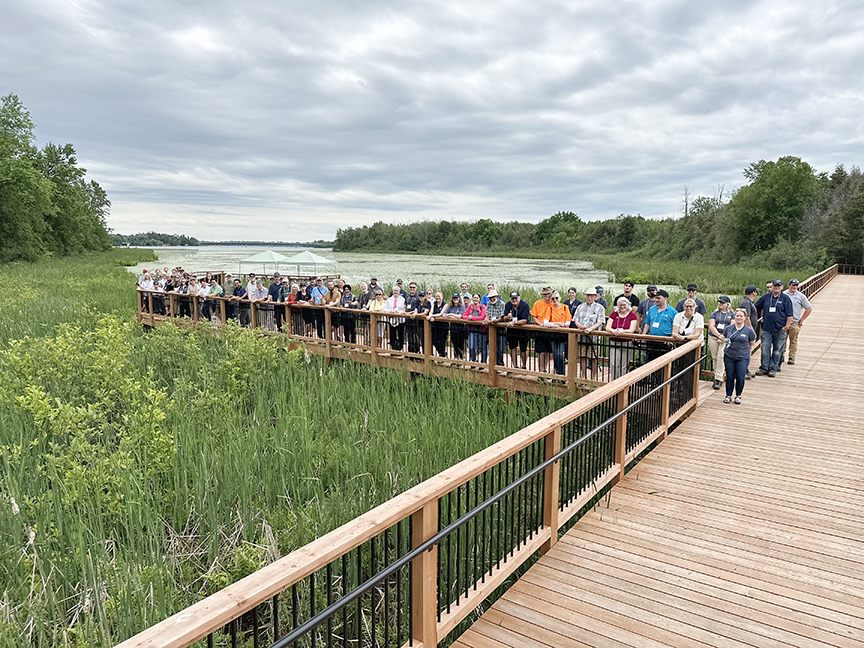
-30-
NEW Summer Programs at Foley Mountain!
New this summer, Foley Mountain Conservation Area will offer an exciting suite of family and children's programming throughout July and August, including summer Forest School sessions for several age groups. Join our qualified and experienced outdoor educators for some summer fun in the forest! Registration is required and will close the Wednesday prior to the program date. Fees vary by program. All program fees are subject to applicable taxes.
Family Programs:
Join us the first Saturday of the month and two Fridays per month throughout the summer for our exciting family programs! All children must be accompanied by an adult. Pre-registration is required by the Wednesday prior to the event.
Submit a Family Program registration request form to get started. Upon completion of the form, we will send you a registration package, including payment instructions. Please note that filling out this form this does not necessarily guarantee a space in the program but begins the registration process.
| Date | Program | Age | Time | Costs |
| Saturday, July 6 | Weekend Wanders - Outdoor Survival Skills |
All Ages | 10 - 11:30 a.m. | $27/family |
| Friday, July 19 | Forest Fridays - Beaver Pond Bonanza |
All Ages | 10 - 11:30 a.m. | $27/family |
| Friday, August 2 | Forest Fridays - Outdoor Survival Skills |
All Ages | 10 - 11:30 a.m. | $27/family |
| Saturday, August 3 | Weekend Wanders - Beaver Pond Bonanza |
All Ages | 10 - 11:30 a.m. | $27/family |
| Friday, August 9 | Forest Fridays - A Bug's Life |
All Ages | 10 - 11:30 a.m. | $27/family |
| Friday, August 23 | Forest Fridays - GPS and Geocaching |
All Ages | 10 - 11:30 a.m. | $27/family |
Summer Forest School Programs:
If you've always wanted to try Forest School, this is your chance! We are offering one-day registrations for our bi-weekly Forest School programs, which are organized by age. You can register for all four sessions for your age group, or one at a time.
Submit a Forest School registration request form to get started. Upon completion of the form, we will send you a registration package, including payment instructions. Please note that filling out this form this does not necessarily guarantee a space in the program but begins the registration process.
| Date | Program | Age | Time | Cost |
|---|---|---|---|---|
|
Tuesdays |
Family Forest School |
2 to 5, with guardians |
9:30 - 11:30 a.m. |
$18/child |
| Wednesdays (July 17, July 31, Aug 7, Aug 21) |
Forest Kindergarten | 4 to 5 | 9 a.m. - noon | $30/child |
| Thursdays (July 18, Aug 1, Aug 8, Aug 22) |
School Age Forest School | 6 to 12 |
Full day: 9 a.m. - 3 p.m. |
Full day: $55/child |
| Our Community Partner | ||
 |
Conservation Authorities seek public input on updated development policies and wetland mapping in Eastern Ontario
EASTERN ONTARIO, June 7, 2024 – South Nation Conservation (SNC), Rideau Valley Conservation Authority (RVCA) and the Raisin Region Conservation Authority (RRCA) are welcoming public input on updated development policies and wetland mapping used in Conservation Authority permitting.
On April 1, 2024, the Government of Ontario replaced individual Conservation Authority Regulations under Section 28 of the Conservation Authorities Act, with Ontario Regulation 41/24: Prohibited Activities, Exemptions and Permits. This update requires Conservation Authorities to regulate development activities within 30 metres of all wetlands, as defined by the new regulation.
Conservation Authority staff have completed draft updates to policies, procedures and mapping in response to these provincial changes. Watershed residents are invited to schedule individual meetings (in-person or virtual) or attend an upcoming public open house to learn more about proposed development policy updates and wetland mapping.
|
Civitan Club of Perth |
R.J. Kennedy Community Centre |
|
RVCA Administrative Office |
SNC Administrative Office |
Wetlands provide significant ecosystem services and benefits including flood attenuation,
erosion protection, groundwater recharge, filtration of drinking water supplies, wildlife refuge,
and forest cover, as well as recreational, educational, and research opportunities. Wetlands are
also usually associated with unstable, organic soils and not always suited to development.
The Conservation Authority partners have regulated development activities within Provincially Significant Wetlands and certain Locally Significant Wetlands since 2006. With the new provincial regulation, most wetlands will now be regulated, however, the buffer around them where a development permit is required has been reduced from 120 metres to 30 metres.
“We recognize the important role of wetlands for the environment and our communities,” said SNC Managing Director, John Mesman. “We will work closely with property owners looking to develop their properties to help confirm wetland boundaries to ensure that future development is sustainable and protects the integrity of wetland habitat.”
“Many of the wetlands in our region connect to major waterways and are found within our Natural Heritage Systems,” said RRCA General Manager Alison McDonald. “These areas provide important natural cover, wildlife habitat, and mitigate the impacts of climate change, including flooding and drought.”
“Having updated policies and wetland mapping that reflects the new legislation will also streamline approvals and standardize approaches,” said RVCA General Manager Sommer Casgrain-Robertson. “Policies and mapping are used by staff, municipalities, and property owners to ensure that development is undertaken in a way that protects people and their property from natural hazards while also protecting wetlands and watercourses.
Policy information, draft maps and meeting request links are available online:
- SNC: nation.on.ca/consultations
- RVCA: rvca.ca/regulations-planning
- RRCA: rrca.on.ca/permits
Conservation Authorities work on behalf of their member municipalities to help manage, conserve and restore natural resources and guide sustainable development activities through permitting.
Through acquiring ecologically significant property, managing conservation lands, permitting sustainable development, and providing technical advice and cost-share funding for habitat improvement projects, there are a variety of ways to help improve wetlands and biodiversity within the region. Residents interested in learning more about land donations and project funding are encouraged to contact their local Conservation Authority.
FOR MORE INFORMATION:
South Nation Conservation
Erin Thorne, Communications Specialist,
1-877-984-2948 | .
Rideau Valley Conservation Authority
Diane Downey, Director, Communications and Outreach,
1-800-257-3504, ext.1126 | .
Raisin Region Conservation Authority
Lisa Van De Ligt, Team Lead, Communications and Stewardship,
613-938-3611 ext. 223 | .
- end -
Les offices de protection de la nature sollicitent l'avis du public sur la mise à jour des politiques de développement et de la cartographie des zones humides dans l'Est de l'Ontario
EST DE L'ONTARIO, le 7 juin 2024 : La Conservation de la Nation Sud (CNS), l'Office de protection de la nature de la vallée Rideau (RVCA) et l'Office de protection de la nature de la région Raisin (RRCA) accueillent les commentaires du public sur la mise à jour des politiques de développement et de la cartographie des zones humides dans l'Est de l'Ontario. Les politiques de développement et la cartographie des zones humides sont utilisées dans les permis délivrés par les offices de protection de la nature.
Le 1er avril 2024, le gouvernement de l'Ontario a remplacé les différents règlements des offices de protection de la nature en vertu de l'article 28 de la Loi sur les offices de protection de la nature par le Règlement de l'Ontario 41/24 : Activités interdites, exemptions et permis. Cette mise à jour exige que les offices de protection de la nature réglementent les activités d'aménagement dans un rayon de 30 mètres de toutes les terres humides, tel que défini par le nouveau règlement.
Le personnel de l'Office de protection de la nature a terminé l'ébauche de mises à jour des politiques, des procédures et de la cartographie en réponse à ces changements provinciaux. Les résidents du bassin versant sont invités à planifier des réunions individuelles (en personne ou virtuellement) ou à assister à une prochaine journée portes ouvertes pour en savoir plus sur les mises à jour proposées des politiques de développement et de la cartographie des zones humides.
|
Club Civitan de Perth |
Centre communautaire RJ Kennedy |
|
Bureau administratif de RVCA |
Bureau administratif de la CNS |
Les zones humides fournissent d'importants services et avantages écosystémiques, notamment l'atténuation des inondations, la protection contre l'érosion, la recharge des eaux souterraines, la filtration des réserves d'eau potable, les refuges fauniques, et le couvert forestier, ainsi que des opportunités de loisirs, d'éducation et de recherche. Les zones humides sont également généralement associées à des sols organiques instables et pas toujours adaptés au développement.
Les partenaires de l'Office de protection de la nature réglementent les activités de développement dans les zones humides d'importance provinciale et dans certaines zones humides d'importance locale depuis 2006. Avec la nouvelle réglementation provinciale, la plupart des zones humides seront désormais réglementées, cependant, la zone tampon autour d'elles où un permis d'aménagement est requis a été réduite de 120 mètres à 30 mètres.
« Nous reconnaissons le rôle important des zones humides pour l'environnement et nos communautés », a déclaré John Mesman, directeur, Terres protégées, de la CNS. « Nous travaillerons en étroite collaboration avec les propriétaires fonciers qui cherchent à développer leurs propriétés pour aider à confirmer les limites des zones humides afin de garantir que le développement futur soit durable et protège l'intégrité. d’habitats de zones humides.
« De nombreuses zones humides de notre région sont reliées aux principaux cours d'eau et se trouvent au sein de nos systèmes de patrimoine naturel », a déclaré la directrice générale de la RRCA, Alison McDonald. « Ces zones fournissent une couverture naturelle importante, un habitat faunique et atténuent les impacts du changement climatique, notamment les inondations et la sécheresse. »
« La mise à jour des politiques et de la cartographie des zones humides qui reflètent la nouvelle législation rationalisera également les approbations et normalisera les approches », a déclaré Sommer Casgrain-Robertson, directrice générale de RVCA. « Les politiques et la cartographie sont utilisées par le personnel, les municipalités et les propriétaires fonciers pour garantir que le développement est entrepris de manière à protéger les personnes et leurs propriétés contre les risques naturels, tout en protégeant les zones humides et les cours d'eau.
Des informations politiques, des projets de cartes et des liens de demande de réunion sont disponibles en ligne :
- CNS : nation.on.ca/fr/développement/consultations-publiques
- RVCA : rvca.ca/regulations-planning
- RRCA : rrca.on.ca/permits
Les offices de protection de la nature travaillent au nom de leurs municipalités membres pour aider à gérer, conserver et restaurer les ressources naturelles et guider les activités de développement durable au moyen de permis.
En acquérant des propriétés d'importance écologique, en gérant des terres protégées, en permettant le développement durable et en fournissant des conseils techniques et un financement à frais partagés pour des projets d'amélioration de l'habitat, il existe diverses façons d'aider à améliorer les zones humides et la biodiversité dans la région. Les résidents souhaitant en savoir plus sur les dons de terres et le financement de projets sont encouragés à contacter leur office de protection de la nature local.
POUR PLUS D'INFORMATIONS :
Conservation de la Nation Sud
Erin Thorne, spécialiste des communications
1-877-984-2948 |
Office de protection de la nature de la vallée Rideau
Diane Downey, directrice des communications et de la sensibilisation
1-800-257-3504, poste 200. 1126 |
Office de protection de la nature de la région Raisin
Lisa Van De Ligt, chef d'équipe, Communications et intendance
613-938-3611 ext. 223 |
- fin -
Public Consultation
The RVCA holds public consultation periods for numerous watershed projects. Any active public consultation periods will be posted below.
